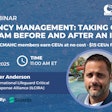
On January 1, a new law went into effect in California that reclassified hundreds of thousands of contract laborers as employees.
The law, often referred to as AB5 or the Uber Law, is aimed at businesses that categorize their workers as “independent contractors” in order to save money and avoid paperwork. Now, large “gig economy” companies operating in the state such as Uber, Lyft, Instacart and DoorDash are responsible for payroll and unemployment taxes, and must provide a host of employee protections unless they can show their workers are independent contractors as narrowly defined by new guidelines.
But AB5 doesn’t just impact the big guys — it also has important ramifications for smaller businesses in industries like pool service. Pool and spa industry veterans will be reminded of other initiatives that have begun in California and spread over time such as pool equipment efficiency regulations, which began as Title 20 on January 1, 2006, and slowly expanded across the country until they culminated in the new DOE pump law that will eliminate most single speed pumps nationwide. Are laws like AB5 next to catch on?
The new law is fiercely opposed by the Silicon Valley startups, which have pledged to spend tens of millions of dollars lobbying for exemption from the law, something general contractors, insurance agencies and doctors’ offices have already received. Uber filed a lawsuit arguing that AB5 is unconstitutional, and has also been collecting signatures on a petition for a ballot initiative that could provide them a route around the law.
Pool pros don’t have the same resources to fight it, and in fact aren’t even united in opposition to the law.
RELATED: Independent Contractors: The Rising Risks of Misclassification
John Norwood, a longtime industry advocate, is president of the California Pool and Spa Association. He heard from members on both sides of the issue during the bill’s debate in the state assembly last year. The employee-based companies saw AB5 as a boon that would level the playing field by forcing competitors to pay the same taxes they’ve been paying all along. Other member companies that rely on independent contractors felt the law would disadvantage them and might even make it impossible to stay in business, and urged CPSA to take a stand against it. The association was being pulled from both sides.
“It was a really tough deal,” he says. “I got a lot of calls from people who were concerned that if we were advocating for independent contractors, we would undermine their employee-based business. Companies using independent contractors contacted me, too. I really did hear from as many on one side of the issue as the other.”
As CPSA’s chief lobbyist, Norwood opted to push for balance and flexibility in the law rather than siding with one faction at the expense of the other. As much as the new law will help combat the underground economy, he reasoned, allowances should be made for companies that want to employ private contractors the right way. But what is the right way? Can service companies continue to use independent contractors and remain compliant with the law?
PLEAS FOR COMPLIANCE
WHY YOU SHOULD COMPLYGiven the estimated 400,000 workers doing side hustles like delivering groceries or working full-time as freelancers writers or physical therapists, it’s tempting to assume it would take forever for the state to get around to checking up on the small operator classifying its pole pushers as independent contractors. That’s a dangerous assumption, says Jennifer Hatfield, Government Affairs Director for the Pool and Hot Tub Association. “The governor of California just unveiled his budget, and it included money for the enforcement of AB5. He wants to make sure AB5 is followed,” she says. “So we want our members to fully understand that this bill has passed, it is the law of the land, and you need to make sure you’re following it.” Another reason to follow AB5 to the letter is the personal injury attorneys and ambulance chasers that advertise on buses and billboards across the state. “You could have a nice little business with techs classified as independent contractors, and everybody is as happy as can be. But what if a tech gets broadsided in his truck? Some lawyer is going to say to that independent contractor, “You know, you were probably an employee...” |
Above all, Norwood says, the law is here, now. It’s important to avoid the natural tendency to wait and see what enforcement measures will be taken.
David Hawes is president of H&H Pool Service in Dublin, which services about 600 pools per week in the San Francisco area using an employee model. He’s also the IPSSA president, and he understands why companies he represents want to continue using contract laborers. His message to those members: use extreme caution.
“It’s not for the faint of heart,” he says, “and it’s not like the Wild West where you can just shoot from the hip and say, ‘Yeah, I think I’ve got it covered.’ If your true intent is to run a professional organization that way, and you’re in it for the long haul, then you need to seek help from an employment attorney. You’ve got to make sure you’ve got all your documentation in place.
“But to be honest with you, I would rather concentrate my efforts on increasing the size and quality of my business rather than losing sleep over whether or not I’ve dotted my i’s and crossed all my t’s. How would you like to go to a doctor who says, ‘Hey, don’t worry. I know I’m supposed to do this and this, but I found a loophole. So we’ll cut you up on Wednesday?’”
Hawes has an ally in his push to get fellow service companies to comply with instead of combat AB5. Rich Gallo, CEO of PureSwim in Valencia, has been in business doing high-end service in the Los Angeles area for almost 30 years using only employees.
Like Hawes, Gallo is active in IPSSA, serving as the chapter president. He says the vast majority of his constituents fall solidly on the side of fighting the changes. And those people, many of them his good friends, have been unnerved by AB5.
“I got calls from guys saying, ‘We’re not going to do any work after the new year because we don’t know what to do.’ That’s how frightening this whole thing is to people,” Gallo says. “Listen. There’s a solution here, and it’s what you need to do. The first guy I hired was a 1099! So I didn’t use employees right away either. But at a certain point you’ve got to look at yourself like I did and say, ‘I’ve been dodging a bullet here for a couple of years, and now it’s time to step up my game. Take it from a guy like me who has done this himself. I did it, and I should be able to help you find that solution that’ll work for your business, too.”
The first thing to come to terms with is that using employees to do the work does add costs. Gallo’s solution: raise your prices and raise your level of professionalism.
RELATED: NJ Passes Law Requiring Licenses for Pool Builders/Service Techs
Asked how much a typical company may need to raise route rates to afford new taxes and insurance, Gallo is reluctant to attach a number. Too often, he explains, companies will start with a number, then work backwards and settle on whatever profit is left. That’s the wrong approach.
“Let’s work with round numbers. Say you charge $100 a month and you pay the independent guy $75 and he does all the work, buys all the chemicals, everything, up until Dec. 31, 2019, and you’re collecting $25 a month from each customer as a profit,” he says. “Starting the very next day, you’re going to have to take that $75 you’re giving him and determine how much of that is labor. Of course, it’s got to meet the minimum wage standards. Once you figure that out you have to payroll it. And now he has to clock in when he’s going to the first job and clock out when he leaves the last one. And you’ve got to make sure he’s taking his rest breaks, his meal breaks. All that has to be tabulated, and he’s got to get a paycheck for it.
“And then there’s the cost of the liability insurance, the workman’s comp policy, you’re going to have to purchase an employment liability protection policy for wrongful termination, sexual harassment, things like that. So these are all things you may never have thought of. I mean, it’s a brand-new world.”
Talking to each customer on the route will make your price increase an easier pill for them to swallow, he says. Tell them about the new law and what you need to do to be compliant, and point out that if they hire a different pool cleaner that is not compliant, the homeowners expose themselves to a lot of liability.
“Simply raising prices by $50 or $60 a month avoids all that, and I think a majority of people will understand the reasoning and go along with the increases,” he says. “Sure, there will be some blowback, and maybe you’ll lose five or 10 percent of customers, but at the end of the day you will be protected. You will still be in business.”
Hawes understands that what he and Gallo are telling other service companies about compliance may be difficult to stomach. It’s simply too expensive, they’ll say.
“That attitude has always kind of bothered me,” Hawes says. “I’ve been teaching 30-plus years all over the country, and no matter what geographical area you’ll find good solid companies that operate with all their people working as employees.
“A guy like Rich is a testament to charging properly for what you’re doing. I agree with him about looking at your expenses, what you’re charging, and putting everything into the mix. Then figure out what you need to charge to make a comfortable living. Those of us who do that and charge what we’re worth, we make money. It’s not magic. Service companies can afford to have employees.”
LEGAL LITMUS TEST
Norwood, while sympathetic to the concerns of service companies that have used employees all along, insists companies that want to keep operating with private contractors have ways to do it. Those ways, he admits, are very limited, but may be workable thanks to hard-fought amendments he and others got added to the bill before it became law. Businesses looking to take these narrow paths must be aware of the new test the state applies to determine whether someone is a contractor or an employee.
As of now, Norwood says, “you’re presumed to be an employee, and the only way you can overcome that presumption is through proving each element of what’s called the ABC
Test.” (See “The ABC Test” below).
Norwood, who was instrumental in carving out exemptions for independent insurance agents and brokers, helped draft language that will help licensed pool construction companies that use contractors pass the ABC Test. Could it also be applied to pool service companies? Possibly.
“Say you have a pool company with a builders’ license and an extensive service operation, and as long as those workers all have D35 licenses, that would be fine as long as they work for other people, run their own businesses, etc.” he explains. “In other words, if the employer has a broader license than the people doing service, and those D35’s have their own businesses and are doing work for other people, you would pass the ABC Test.
RELATED: New Overtime Law To Take Effect
Obviously, not a lot of service guys have D35s, but why not push for that?”
A “referral agency” section on the bill could also prove helpful. Lawmakers added it to cover services like Thumbtack and HomeAdvisor, but Norwood says the law contains no definition of what a referral agency is. It’s open to interpretation.
“I don’t know if that’s something they’re going to clean up or not, but right now you could set yourself up as a referral agency,” he says. “So these things are not perfect,” he adds, “but like I said we got some options put in there — a lot more options than some industries got, like truckers, physical therapists and freelance writers.”
Both these scenarios represent tricky paths to compliance, and carry some risk, as the burden of proof will fall on the employer. Don’t take that burden lightly, Norwood advises, or plan to put it off until you see some evidence of forced compliance.
“The law has changed and it’s time to act now,” he says. “And people are looking for help with that. We’ve had a couple of webinars and some face-to- face meetings, and have information on the website, but there’s no way we can provide individual advice for each person.
“We do have a couple of really good lawyers to recommend people can retain, and it’s not cost-prohibitive. They can take a look at your business and advise you on how to move forward.”
Norwood is quick to add that his work did not stop once Governor Gavin Newsom signed AB5 into law last September. Further changes are possible at the statehouse, so wider and more plentiful paths to compliance may be added.
“If the Uber lawsuit is successful, the legislature would have to come back and create a little more flexibility on the ABC Test. There are about 30 states that use it, but some have more flexibility. There’s factor B1 or B2 or B3 or whatever. That’s what we’d like to see here in California.”
THE ABC TESTSAY GOODBYE TO BORELLOWhen the California Supreme Court handed down its ruling in Dynamex Operations West, Inc., v. Superior Court two years ago, it meant that all workers would be considered employees unless a company could prove that they met all three criteria for being classified as independent contractors: 1. The worker is free from the control and direction of the hiring entity in connection with the performance of the work, both under the contract for the performance of the work and in fact. 2. The worker performs work that is outside the usual course of the hiring entity’s business. 3. The worker is customarily engaged in an independently established trade, occupation, or business of the same nature as the work performed. Unsure of whether your company can prove those three things? Ask an employment attorney, Jennifer Hatfield, Government Affairs Director for the Pool and Hot Tub Association. “There are some narrow exceptions,” she says, “and if you can get in under one of those? Great! But I highly caution against assuming you can meet one of them. You’ve got to be very careful, and in that situation you’re going to want to hire an attorney.” |









































